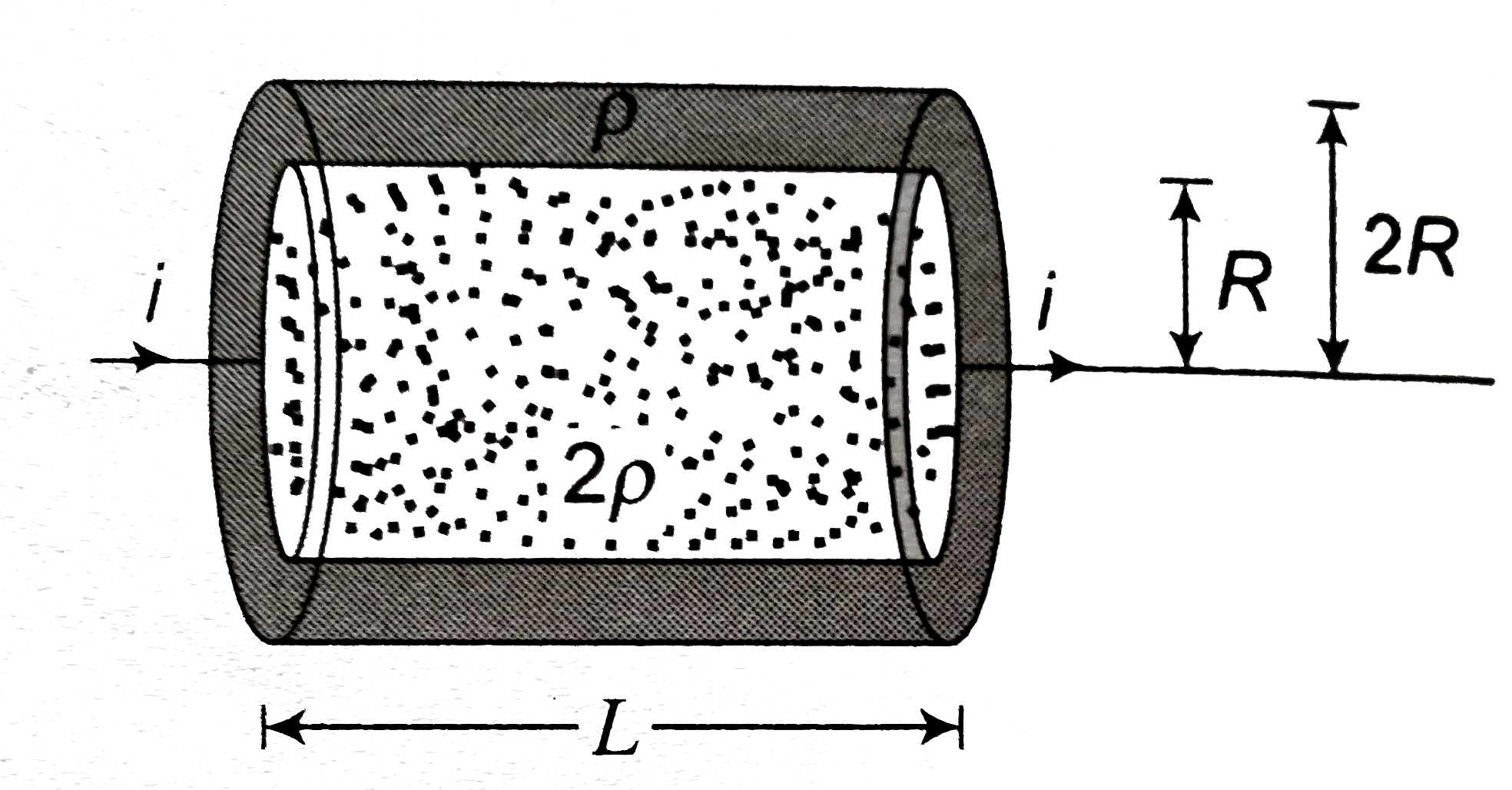Calculate the percentage error in specific resistance , ρ=πr2R/l, where r = radius of wire =0.26±0.02cm , l = length of wire =156.0±0.1cm, and R = resistance of wire =64±2Ω.
The correct Answer is:~18.6%
To calculate the percentage error in specific resistance (ρ), we will follow these steps:
Step 1: Understand the formula for specific resistance
The specific resistance (ρ) is given by the formula:
ρ=πr2Rl
where:
- r = radius of the wire
- R = resistance of the wire
- l = length of the wire
Step 2: Identify the values and their uncertainties
We are given:
- r=0.26±0.02 cm
- l=156.0±0.1 cm
- R=64±2 Ω
Step 3: Calculate the percentage error formula
The percentage error in ρ can be calculated using the formula for propagation of uncertainty:
Percentage Error=(Δρρ)×100
Where:
- Δρ is the total uncertainty in ρ.
Since ρ depends on r2, R, and l, we can express the percentage error as:
Δρρ=2Δrr+ΔRR+Δll
Step 4: Substitute the values into the error formula
Now we substitute the values into the formula:
- Δr=0.02 cm, r=0.26 cm
- ΔR=2 Ω, R=64 Ω
- Δl=0.1 cm, l=156.0 cm
Calculating each term:
1. For r:
2Δrr=2×0.020.26≈0.1538
2. For R:
ΔRR=264=0.03125
3. For l:
Δll=0.1156.0≈0.000641
Step 5: Combine the errors
Now, we add these percentage errors together:
Δρρ=0.1538+0.03125+0.000641≈0.185691
Step 6: Convert to percentage
Now, multiply by 100 to get the percentage error:
Percentage Error=0.185691×100≈18.57%
Step 7: Round off the result
Rounding off to three significant figures, we get:
Percentage Error≈18.6%
Final Answer
The percentage error in specific resistance is approximately 18.6%.
---
The specific resistance (ρ) is given by the formula:
ρ=πr2Rl
where:
- r = radius of the wire
- R = resistance of the wire
- l = length of the wire
We are given:
- r=0.26±0.02 cm
- l=156.0±0.1 cm
- R=64±2 Ω
The percentage error in ρ can be calculated using the formula for propagation of uncertainty:
Percentage Error=(Δρρ)×100
Where:
- Δρ is the total uncertainty in ρ.
Δρρ=2Δrr+ΔRR+Δll
Now we substitute the values into the formula:
- Δr=0.02 cm, r=0.26 cm
- ΔR=2 Ω, R=64 Ω
- Δl=0.1 cm, l=156.0 cm
1. For r:
2Δrr=2×0.020.26≈0.1538
ΔRR=264=0.03125
Δll=0.1156.0≈0.000641
Now, we add these percentage errors together:
Δρρ=0.1538+0.03125+0.000641≈0.185691
Now, multiply by 100 to get the percentage error:
Percentage Error=0.185691×100≈18.57%
Rounding off to three significant figures, we get:
Percentage Error≈18.6%
The percentage error in specific resistance is approximately 18.6%.
Topper's Solved these Questions
- DIMENSIONS & MEASUREMENTBOOK - CENGAGE PHYSICSCHAPTER - DIMENSIONS & MEASUREMENTEXERCISE - Single Correct
93 Videos
- DIMENSIONS & MEASUREMENTBOOK - CENGAGE PHYSICSCHAPTER - DIMENSIONS & MEASUREMENTEXERCISE - Multiple Correct
2 Videos
- DIMENSIONS & MEASUREMENTBOOK - CENGAGE PHYSICSCHAPTER - DIMENSIONS & MEASUREMENTEXERCISE - Exercise 1.3
17 Videos
- CENTRE OF MASSBOOK - CENGAGE PHYSICSCHAPTER - CENTRE OF MASSEXERCISE - INTEGER_TYPE
1 Videos
- FLUID MECHANICSBOOK - CENGAGE PHYSICSCHAPTER - FLUID MECHANICSEXERCISE - INTEGER_TYPE
1 Videos
Similar Questions
Find the percentage error in specific resistance given by ρ=πr2Rl where r is the radius having value (0.2±0.02)cm, R is the resistance of (60±2)ohm and l is the length of (150±0.1)cm.
View SolutionIf 2x% be the percentage error in specific resistance given by ρ=πr2Rl where r is the radius having value (0.2om0.01) cm, R is the resistance of (60±3) ohm and l is the length of (150±1.5) cm. Find x.
View Solution
Knowledge Check
The new resistance of wire of RΩ, whose radius is reduced half, is
A16RB3RC2RDRThe specific resistance ρ of a circular wire of radius r, resistance R, and length l is given by ρ=πr2R/l. Given : r=0.24±0.02cm,R=30±1Ω , and l=4.80±0.01cm. The percentage error in ρ is nearly
A7%B9%C13%D20%The resistance of a wire is R . If the length of the wire is doubled by stretching, then the new resistance will be
A2RB4RCRDR4
The specific resistance ρ of a circular wire is given by ρ=πr2R/l . Given: radius r=0.20±0.02cm , resistance R=25+1Ω , and length 1=5.00±0.01cm. The percentage error in ρ is ______ %.
View SolutionCalculate the the resistivity of the material of a wire whose resistance is 5Ω, length 1m and radius 0.6mm.
View SolutionThe resistance of a wire of length 80cm and of uniform area of cross-section 0.025cm2, is found to be 1.50 ohm. Calculate the resistivity of the wire.
View SolutionA solid lead ball of radius 6 cm is melted and then drawn into a wire of diameter 0.2 cm. The length of wire is
View SolutionThe resistance between ends will be (ifρLπR2=R0)
 .
.
View Solution
